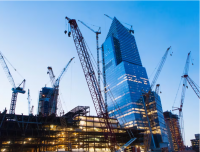
Private markets have largely reverted to pre-pandemic levels in terms of fundraising, investment activity, and valuations, creating a favourable environment for new investments. In 2023, fundraising was concentrated on large funds, making small and mid-sized private market strategies particularly attractive.
Although interest rates are likely to remain higher for longer, Nils Rode, Chief Investment Officer (CIO), Schroders Capital, anticipates that easing inflation and potential interest rate cuts will provide a tailwind for private market investments in the short to mid-term. This is especially true for real estate, where significant valuation corrections have occurred.
Given ongoing geopolitical risks and domestic political tensions as well as escalation risks from ongoing conflicts, it's essential to maintain high selectivity and robust diversification within private market allocations. In the following, we highlight the most attractive opportunities within each private asset class.
Private equity
Private equity has broadly normalised with fundraising and deal volumes back to pre-Covid levels. Larger exits, however, remain especially slow relative to 2019, while smaller exits have been more stable. Rode advocates for a highly selective approach to private equity investments, focusing on opportunities that resonate with global trends.
Schroders Capital prefers small to mid-sized buyouts over larger ones due to a more favourable dry powder environment and a valuation discount of around 6x EV/EBITDA. Furthermore, there are attractive exit opportunities for small buyouts as around 60% of dry powder currently sits with large buyout funds.
From a geographic perspective, we find North America, Western Europe, China and India attractive. China remains the second-largest private equity market globally. India's private equity market is promising due to its robust long-term economic growth prospects, a rapidly growing private equity industry, and a broad spectrum of high-growth private companies.
Private debt and credit alternatives
Income remains highly attractive across most markets. Despite peaking interest rates in developed markets, Rode anticipates they'll remain higher than levels seen in the past two decades, suggesting an opportunity to reallocate to income.
Banks in the US and Europe continue to reduce their lending volumes as they attend to increasing regulatory pressure as well as distress in their commercial real estate loan portfolios. The result is a significant risk premium available beyond rates for alternative, non-bank lenders. As risk premiums in the liquid debt market have collapsed, private debt and credit appear very attractive.
Infrastructure
In the infrastructure segment, energy transition plays an important role. It is particularly compelling due to its strong inflation correlation and secure income traits. Energy transition also diversifies portfolios through exposure to distinct risk premiums like energy prices.
The push for decarbonisation, coupled with energy security concerns, which are amplified by the conflict in Ukraine, continues to benefit renewable energy. The cost-of-living crisis has also spotlighted the issue of energy affordability. In many regions globally, renewables have become the most cost-effective option for new electricity production.
Currently, renewable energy in Europe has a €600 billion base, representing 45% of infrastructure transactions. By the early 2030s, this is forecast to more than double to €1.3 trillion, potentially making renewables and energy transition infrastructure the majority of investable assets in the sector.
Renewable-related technologies, such as hydrogen, heat pumps, batteries, and electric vehicle charging, will play a crucial role in facilitating the decarbonisation of sectors like transport, heating, and heavy industries.
Real estate
The real estate market has been experiencing value corrections across the globe. This presents a live sequential opportunity to access the asset class on an attractive basis. Indeed, the Schroders Capital proprietary valuation framework suggests that 2024 and 2025 will be opportune years for real estate investments, with some market segments likely to have already fully rebased.
Despite more volatile geopolitical conditions, we believe that interesting investment opportunities are starting to arise in selected parts of the markets where strong fundamentals prevail. Immediate opportunities are present in markets where rapid repricing has occurred, such as the UK and Nordic region. In Asia-Pacific, opportunities that align with China's delayed recovery or support nearshoring/friend shoring of supply chains are favoured.
Industrial and logistics assets have rebased to attractive price points in most submarkets. Schroders Capital prefers operational properties with strong demand-side tailwinds and direct or indirect inflation-linked income potential.
Further reading: "Schroders Capital investment outlook: An attractive investment environment” by Nils Rode, Chief Investment Officer (CIO), Schroders Capital.







